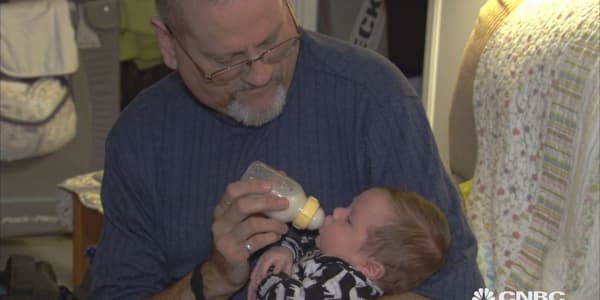As Obamacare enrollment season begins, the number of Americans signing up for the health insurance coverage has been much higher than expected. That likely includes an overlooked segment of individual health-care buyers: America's military veterans.
Recent headlines make clear that after multiple failures to repeal Obamacare this year, the GOP has no plans to pull back from its Affordable Care Act repeal effort. That means many military veterans — already dealing with the stress and uncertainty of return to civilian life after deployment — will be among Americans in continued health insurance limbo as long as the ACA political battle lasts.
Analysis from RAND reveals that the ACA increased health insurance coverage rates among veterans. The study states that an Obamacare repeal would reduce the health-care options provided to veterans and also could place additional stress on the already challenged VA health-care system.
There are 20 million veterans in the United States, according to the VA, and Census data reveals that 5.5 percent, or 510,000 non-elderly veterans (under 65), are uninsured. Only 3 out of 5 non-elderly veterans are eligible for Veteran Affairs health care. If they are not eligible for the VA, many veterans turn to Medicaid under the Affordable Care Act. Some also rely on both Medicaid and the VA system.
Before major state Medicaid expansions took place in 2013, only 1 in 10 non-elderly veterans were insured, according to the RAND study. By 2015 uninsurance rates fell by 36 percent.
"What we found is non-elderly veterans were more likely to be insured in 2015 than they were in 2013," said Michael Dworsky, co-principle investigator of the RAND report study. "There was not just a reduction in numbers of uninsured, but a reduction of veterans who said their only source of health coverage was the VA."
Out of 2.8 million non-elderly veterans enrolled in the VA health-care system, only 25.8 percent of them rely on it as their sole source of health insurance.
"People very often think that people that serve in the military get health care for life, but that's not really how the VA works," Dworsky said. "Although many veterans are enrolled in the VA, there is still a large number who are uninsured and have no regular access to health care."
Military veterans who served for 24 consecutive months — or another specified full duty period — are eligible for coverage for five years after being discharged. Elderly veterans qualify for Medicare and about half of all veterans in 2016 had health insurance coverage through the government program.
But that leaves many veterans who served in recent decades with a potential health insurance gap after their five-year period and before they become eligible for Medicare. Census data found that for the other half of the veteran population — who were of working age (ages 19 to 64) — both the number and rate of those without health insurance declined to a new low during the past four years.
The GOP's next moves in killing Obamacare
After the failure of the American Health Care Act and "skinny repeal," President Donald Trump is reportedly working on an executive order to repeal the individual mandate requiring health insurance purchases within the Affordable Care Act — if Congress doesn't do the same thing within the tax-reform legislation.
Even if those efforts stall, House Speaker Paul Ryan has already said Obamacare repeal will be back on the docket in 2018. Trump has already signed two executive orders in order to take steps toward an ACA repeal — one he signed hours after being sworn in as president and another in October.
The RAND study projected that had the American Health Care Act passed, uninsurance levels would surpass what they were even before ACA levels of coverage. "It's not just the numbers of veterans insured, but it's also which ones they are," Dworsky said, adding that the negative effect concentrates among the low-income and unhealthy veterans.
If the ACA were to be repealed and replaced, it would be devastating to veterans and to military families.Will Fischerdirector of government relations at VoteVets
Maine just became the first state to pass the ACA's Medicaid expansion by way of an Election Day ballot referendum that defied the state's governor, but that was matched by President Trump's administrator of the Centers for Medicare and Medicaid Services, Seema Verma, saying this week the administration would approve proposals from states to require work or community engagement for people who want to receive Medicaid, which critics say will cut off access to health care.
The ongoing uncertainty has led some veterans advocacy groups to throw their political weight behind efforts to protect the ACA from GOP attacks.
"One out of every 10 veterans in the United States would be losing their Medicaid," said Will Fischer, director of government relations at VoteVets, a left-leaning veterans' political advocacy group, and a veteran of the war in Iraq.
The RAND report showed that the largest growth of insured veterans was found in Medicaid expansion states, particularly Oregon, Arkansas, Nevada, Kentucky and Washington. Among low-income nonelderly veterans, Medicaid expansion increased enrollment in Medicaid by 8.4 percentage points relative to similar veterans in non-expansion states. Among all veterans there was a 2.4 percent increase.
More from Modern Medicine:
ER costs skyrocket, leaving patients in shock
America's No. 1 killer is center stage in battle over drug pricing
How to handle stress after traumatic events
RAND stressed that there were other factors at work in recent years that contributed to an increase in health insurance coverage for veterans. The increase in nonelderly veteran Medicaid coverage occurred parallel to an increase in private insurance purchases that Dworsky attributes to the growing economy. "Individual market coverage should go up when the economy is doing well," he said.
Other veterans and advocacy groups are pushing for health care reform that would benefit those who have served the country in combat, but are not focused on the ACA repeal debate.
Reforming the scandal-ridden VA in Trump era
The bigger problem, according to Dan Caldwell, an Iraq war veteran and policy director of Concerned Veterans for America, a conservative veteran advocacy group backed by Charles G. and David H. Koch, is that some veterans are not receiving proper insurance coverage because of the VA's outdated infrastructure. That's why Concerned Veterans is advocating that private health care be allowed to compete with Veterans Affairs hospitals for the patronage of the nation's veterans.
"I think the biggest issue with the VA right now is it is not effectively set up to serve the VA population of today or the future," Caldwell said.
Among the reasons for the low numbers of veterans receiving health care at the VA are eligibility requirements, such as income level, disability, or former prisoner of war status. In other cases, it's about distance from VA centers, or even preference.
"I think that a lot of veterans have stayed away from the VA because of either reputation or they have had a negative experience with the VA and have chosen not to go back," Caldwell said. "They believe that if they go they are not going to get the best service."
The RAND study found that Medicaid expansion led to larger coverage increases for low-income veterans living far from VA facilities, suggesting that Medicaid expansion may have provided a valuable new coverage option for veterans facing barriers to accessing VA.
Caldwell served as chief of staff for Arizona Republican Congressman David Schweikert from 2011 to 2013, originally starting as a constituent caseworker focused on issues with the Department of Veterans Affairs and Department of Defense. In recent years Caldwell's group has proposed the Veterans Independence Act to place veterans at the center of the VA health-care system. It also wants to streamline the process to fire, demote and punish VA employees who perform poorly or are guilty of misconduct.
Over the past decade, the VA has been hit with multiple scandals and whistleblower complaints. The government's Office of the Special Counsel has investigated staffing, equipment and patient service issues, as well as individual VA centers manipulation of data, and millions paid out in bonuses to VA executives amid the scandals.
There is a lot of legislative momentum to pass expanded choice legislation because the only choice program in place, the Veterans Choice program, is set to run out of funding before the end of the year, putting pressure on lawmakers to find a solution.Jim FellingerConcerned Veterans for America spokesman
Since Trump took office, changes at the VA are one of the few areas where the president has been able to find bipartisan support, though some of the measures were under consideration before the election. He signed the VA Accountability Act, which makes it easier to fire misbehaving VA officials as well as a law which makes it faster and easier for vets to appeal their VA decision about disability ratings. The government has also begun publishing wait times online for every VA facility, and delivering same-day emergency mental health services at every VA medical center.
What lies ahead
Trump named former VA Under Secretary for Health David Shulkin to the top post at the VA this year, who has vowed to reform the VA, though he is an Obama era holdover. Shulkin, a doctor, previously served as the head of multiple medical systems in the university sector.
Trump and Shulkin have both spoken about the Veterans Choice Program, which lets veterans who are eligible for VA benefits to receive care outside the VA system. The president signed a funding bill in August to keep the program solvent, but that was required because the system was already near bankrupt and facing layoffs and interrupted medical care for thousands of veterans.
At Concerned Veterans for America, the ongoing problems with the Veterans Choice program provide legislative hope, as does President Trump's support for expanded choice which he highlighted on the campaign trail.
"There is a lot of legislative momentum to pass expanded choice legislation because the only choice program in place, the Veterans Choice program, is set to run out of funding before the end of the year, putting pressure on lawmakers to find a solution. ... It was Congress that kicked the can down the road by not enacting permanent choice reforms sooner," Jim Fellinger, spokesman for Concerned Veterans said in a follow-up email to CNBC.
The veterans group said that in the House of Representatives, VA committee chairman and Tennessee Republican Phil Roe has been a huge advocate of expanded choice. In the Senate, Texas Senator Ted Cruz has been calling for expanded choice and joined Concerned Veterans for America for a series of town halls this past summer focused on expanding health care choice for veterans beyond the VA.
Fischer said the VA, the nation's largest integrative health care system, simply would not be able to handle the pressure of all the veterans that would turn to it if the ACA were to be repealed.
"That would put a huge rush on the VA system, a system that, while yes, it is a world-class health care provider, has at this moment 50,000 vacancies. … Of course you would see the number of uninsured veterans in this country go up drastically." Fischer said. "If the ACA were to be repealed and replaced, it would be devastating to veterans and to military families."
— By Jessica Mathews, special to CNBC.com





